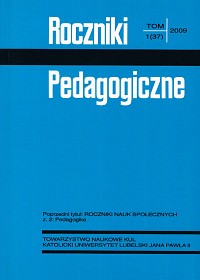Refleksje o powołaniu w chrześcijańskiej koncepcji wychowania
Main Article Content
Abstrakt
Christian is a religion that assumes the personalistic and integral conception of man. The human individual is an individual and personal being with physical (carnal) and spiritual (religious, eschatological) dimensions. In the process of shaping a mature Christian personality the awareness of vocation, hope for full (physical, intellectual, social, and religious-moral) development, and accomplishment of the human goal worthy of the person play an important role. The awareness of one's own calling, general (to holiness) and personal (to a particular social role), are important elements in Christian education. This education is based on the principles of religion initiated by Jesus, and it consists in conveying His message and self-improvement of the faithful in conformity with the rules of the Gospel. The latter's ideal being the love of God and brotherly love among people.
Now analysing the issue of vocation and hope in Christian education one may state that in the light of the Catholic doctrine man is a person capable of development. In this process it is important that the faithful understand their own calling and adopt attitudes of love and hope. Hope strengthens motivation to realise general propositions and individual obligations, that is, social roles. Man is called by God to salvation and definite tasks. With his autonomous decision he responds to this calling by his respective way of life. The latter shoud be imbued with the faith in God, love of God and neighbour, and hope that one has some opportunities for development, perfectibility (to be holy) and eternal life. According to Christian understanding, God with His independent decision endows man with the gift of calling to life and holiness. Man may accept this proposal or not. Acting against God's intention, however, always brings forth dramatic consequences.
To sum up, we may say that the attitude of Christian hope helps us overcome the difficulties in our worldly life, so that we can make efforts to accomplish the goal of the Kingdom of God (heaven). The awarness of one's own vocation and a clear goal, i.e. life with God and eternal bliss, are important elements that confer the ultimate sense on human existence and factors conducive to the personal development of man.
Article Details
Bibliografia
Bauman Z., Ponowoczesność jako źródło cierpień, Warszawa: Wydawnictwo Sic! 2000.
Chlewiński Z., Dojrzałość: osobowość, sumienie, religijność, Poznań 1991.
Chudy W., Odchodzenie z nadzieją. U podstaw pedagogiki umierania, w: Dar i tajemnica śmierci. Tydzień Eklezjologiczny 2006, W trosce o Kościół, t. VII, red. K. Mielcarek, Lublin 2006.
Cichosz W., Wychowanie chrześcijańskie wobec postmodernistycznej prowokacji, Gdańsk 2001.
Dziekoński S., Rozwój wychowawczej myśli Kościoła na przestrzeni wieków, Warszawa 2004.
Guillet J., Jezus Chrystus w naszym świecie, Warszawa 1980.
Hergesel T., Jezus cudotwórca, Katowice 1987.
Integralne wychowanie w myśli Jana Pawła II, Lublin: Wydawnictwo KUL 2004.
Kunowski S., Teologia a potrzeby pedagogiki katolickiej. „Ateneum Kapłańskie” 1959, z. 300-302.
Martini C. M., Jezus jako wychowawca, „Horyzonty Wiary” 1993, nr 10.
Melosik Z., Pedagogika postmodernizmu, w: Pedagogika. Podręcznik akademicki, t. I, red. Z. Kwieciński, B. Śliwerski, Warszawa 2003.
Nadzieja, w: Słownik teologii biblijnej, red. X. Leon-Dufour, Pallottinum, Poznań–Warszawa 1985, s. 509-512
Nowak M., Podstawy pedagogiki otwartej, Lublin: Redakcja Wydawnictw Katolickiego Uniwersytety Lubelskiego 2000.
Occhialini U., La speranza della Chiesa pellegrina. Teologia della speranza nelle “Enarrationes in psalmos” di s. Agostino, Asisi 1965
Powołanie, w: Słownik teologii biblijnej, red. X. Leon-Dufour, Pallottinum, Poznań–Warszawa 1985, s. 747-749.
Rynio A., Katolicka myśl pedagogiczna. Próba syntezy, w: Pedagogika katolicka. Zagadnienia wybrane, red. A. Rynio, Stalowa Wola 1999.
Siek S., Osobowość. Struktura, rozwój, wybrane metody badania, Warszawa 1982.
Studer B., Speranza, w: Dizionario Patristico e di Antichita Cristiane, t. II, Roma 1984, kol. 3268-3278
Van Menxel F., Elpis, Espoire, Esperance, Etudes semantiąues et theologiąues du vocabulaire dell'esperance dans l'Hellenisme et le Judaisme avant le Nouveau Testament, Frankfurt 1983;
Visona G., La speranza nei padri, Torino 1993.
Wojtyła K., Miłość i odpowiedzialność, Lublin: TN KUL 1986.
